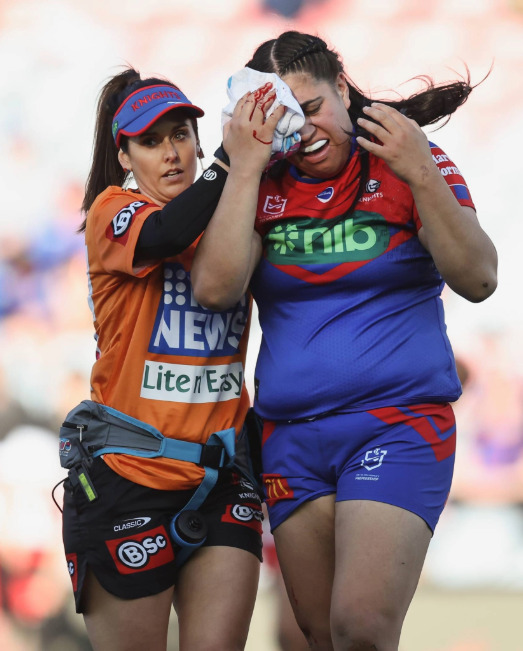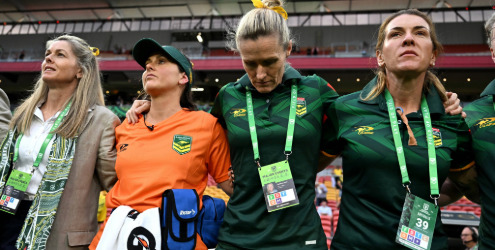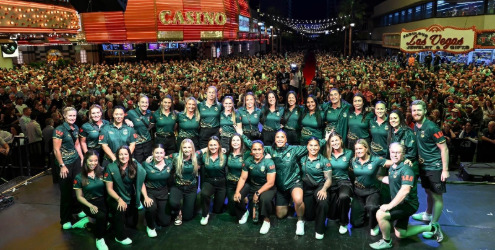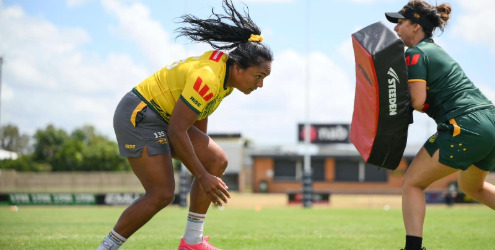Career
Copyright@ Australian Catholic University 1998-2026 | ABN 15 050 192 660 CRICOS registered provider: 00004G | PRV12008
Copyright@ Australian Catholic University 1998-2026 | ABN 15 050 192 660 CRICOS registered provider: 00004G | PRV12008

Pursuing her love of sport through a degree in exercise science was one of the wisest decisions that physiotherapist Rebecca Lang has ever made. And yet, it took her some time to pinpoint exactly where in the sporting and science world she belonged.
At the time, Bec’s only exposure to physiotherapy was from the perspective of a patient.
“I played lots of sport growing up – touch footy, athletics, netball and basketball – and whenever I got injured, I’d go to the physio for treatment and I’d think, ‘This is a really cool job’,” she says.
A work placement at a sports clinic in Sydney finally confirmed that physiotherapy was the perfect fit.
“I had a little bit to do with the physios during that placement,” she recalls, “and it made me realise that it was the right career path for me.”
Bec went on to obtain further qualifications in physiotherapy and has now worked in the field for more than a decade. She runs her own private clinic, RL Physiotherapy, with clients including both amateur and elite athletes, and is currently the head physio for the Newcastle Knights in the NRLW.
In early 2025, she travelled to Las Vegas with the Australia’s national rugby league team the Jillaroos, running the orange shirt as a physio in the historic test match against England.

“To be part of the support crew during that trip, it was pretty special,” says Bec, who is a vocal supporter of women’s sport.
“The atmosphere over there was amazing, and to be there treating the athletes who are changing the game at a time when women are finally seeing pathways and opportunities, it was a moment I’ll cherish for a very long time.”
Bec grew up as a passionate rugby league supporter in Mudgee where her family played a hands-on role in the local club, the Mudgee Dragons.
No slouch with a footy in her hands herself, having represented Australia in women’s touch football, Bec has been buoyed by the rapid growth of the NRLW. In coming years, the competition is set to expand dramatically, with rising viewer and participation numbers.
“It’s exciting not only for the players, but also for the support staff like the sports scientists and physiotherapists,” she says. “It has opened up so many new research pathways, and we’re learning more about the different ways the female body responds to competition.”

Bec is currently studying in ACU’s unique double degree, the Master of Sports and Exercise Physiotherapy/Master of High Performance Sport. The program empowers working physiotherapists to acquire advanced knowledge, using an evidence-informed approach to enhance athletic performance, manage injury, and treat health conditions.
“I’m absolutely loving it,” says Bec, who juggles study alongside work commitments. “The course has really motivated me to up my game, and I’m applying the new knowledge I’m learning into my practice all the time.”
Though she is an experienced practitioner, moving into professional sport has been a steep learning curve for Bec.
“There was this transition from the clinical brain to the elite sports brain, where you quickly realise that most athletes are carrying niggles, and there’s a really different approach to managing injury until they get to game day,” she says.

“The other thing is that athletes have a strong drive to get back on the field, and that really helps – it can make it easier to help them to recover as quickly and as safely as possible.”
Bec hopes the new skills she has picked up will help her to handle even the toughest of cases.
“The best thing about learning new things and broadening your knowledge base as a physio is that it allows you to be more flexible and adaptable,” she says.
“If something isn't working, you have the ability to pivot and shift, ensuring that you’re doing your best for the person in front of you.”
As for her future career goals, Bec hopes to one day work full-time in elite sport, treating female athletes who at the top of their game.
“I’m all about pushing the boundaries, and the advice I’d offer to any other physio is to put yourself out of your comfort zone,” she says. “It can feel daunting and scary, but there’s nothing quite like the feeling of exciting your brain and challenging yourself. It feels so good to take the leap.”
Copyright@ Australian Catholic University 1998-2026 | ABN 15 050 192 660 CRICOS registered provider: 00004G | PRV12008